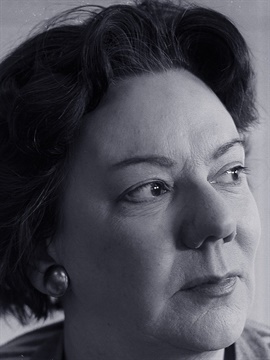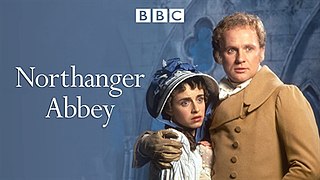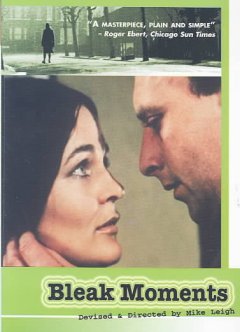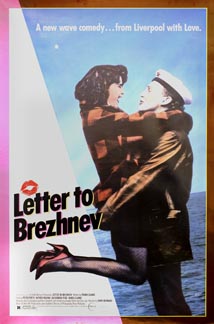
The United Kingdom has had a significant film industry for over a century. While film production reached an all-time high in 1936, the "golden age" of British cinema is usually thought to have occurred in the 1940s, during which the directors David Lean, Michael Powell, and Carol Reed produced their most critically acclaimed works. Many British actors have accrued critical success and worldwide recognition, such as Audrey Hepburn, Olivia de Havilland, Vivien Leigh, Glynis Johns, Maggie Smith, Laurence Olivier, Michael Caine, Sean Connery, Ian Mckellen, Joan Collins, Judi Dench, Julie Andrews, Daniel Day-Lewis, Gary Oldman, Emma Thompson, Anthony Hopkins and Kate Winslet. Some of the films with the largest ever box office returns have been made in the United Kingdom, including the fourth and fifth highest-grossing film franchises.

Dandy Nichols was an English actress best known for her role as Else Garnett, the long-suffering wife of the character Alf Garnett who was a parody of a working class Tory, in the BBC sitcom Till Death Us Do Part.

Colin Andrew Firth is an English actor and producer. He was identified in the mid-1980s with the "Brit Pack" of rising young British actors, undertaking a challenging series of roles, including leading roles in A Month in the Country (1987), Tumbledown (1988) and Valmont (1989). His portrayal of Mr. Darcy in the 1995 television adaptation of Jane Austen's Pride and Prejudice led to widespread attention, and to roles in more prominent films such as The English Patient (1996), Shakespeare in Love (1998), The Importance of Being Earnest (2002), Girl with a Pearl Earring (2003), and Love Actually (2003), co-starring as Mark Darcy in the romantic comedy films Bridget Jones's Diary (2001), Bridget Jones: The Edge of Reason (2004), and Bridget Jones's Baby (2016), and Harry Bright in the musical comedy films Mamma Mia! (2008) and Mamma Mia! Here We Go Again! (2018).

Alan John Clarke was an English television and film director, producer and writer.
Alan George Bleasdale is an English screenwriter, best known for social realist drama serials based on the lives of ordinary people. A former teacher, he has written for radio, stage and screen, and has also written novels. Bleasdale's plays typically represented a more realistic, contemporary depiction of life in Liverpool than was usually seen in the media.

Nineteen Eighty-Four is a British television adaptation of the 1949 novel of the same name by George Orwell, originally broadcast on BBC Television in December 1954. The production proved to be hugely controversial, with questions asked in Parliament and many viewer complaints over its supposed subversive nature and horrific content. It starred Peter Cushing, Yvonne Mitchell, Donald Pleasence and André Morell.

The Wednesday Play is an anthology series of British television plays which ran on BBC1 for six seasons from October 1964 to May 1970. The plays were usually original works written for television, although dramatic adaptations of fiction also featured. The series gained a reputation for presenting contemporary social dramas, and for bringing issues to the attention of a mass audience that would not otherwise have been discussed on screen.

Billy the Kid and the Green Baize Vampire is a 1985 British independent musical fantasy horror comedy-drama sports film starring Phil Daniels and Alun Armstrong. The film was directed by Alan Clarke and written by Trevor Preston. The BFI has described it as "undoubtedly the only vampire snooker musical in cinema history". The film is loosely based on the rivalry between the snooker players Ray Reardon and Jimmy White.

Margi Clarke is an English actress and radio and television presenter. She had a leading role in the film Letter to Brezhnev (1985), a low-budget film which had an international release. Later, Clarke played Jackie Dobbs in the ITV soap opera Coronation Street.
David Leland was a British film director, screenwriter and actor who came to international fame with his directorial debut Wish You Were Here in 1987.
Pik-Sen Lim is a Malaysian-British actress. According to the British Film Institute, Lim was "the most familiar Chinese actor on British television screens in the 1970s and 80s."
Simon Langton is an English television director and producer. He is the son of David Langton, the actor who played Richard Bellamy in Upstairs, Downstairs.

Northanger Abbey is a 1987 made-for-television film adaptation of Jane Austen's 1817 novel Northanger Abbey, and was originally broadcast on the A&E Network and the BBC on 15 February 1987. It is part of the Screen Two anthology series.

Stephen Woolley is an English filmmaker and actor. His career has spanned over three and a half decades, for which he was awarded the BAFTA award for Outstanding British Contribution to Cinema in February 2019. As a producer, he has been Oscar-nominated for The Crying Game (1992), and has produced multi-Academy Award nominated films including Mona Lisa (1986), Little Voice (1998), Michael Collins (1996), The End of the Affair (1999), Interview with the Vampire (1994), and Carol (2016). He runs the production company Number 9 Films with his partner Elizabeth Karlsen.

A Private Function is a 1984 British comedy film starring Michael Palin and Maggie Smith. The film was predominantly filmed in Ilkley, and Ben Rhydding in West Yorkshire. The film was also screened in the section of Un Certain Regard at the 1985 Cannes Film Festival.
Alexandra Pigg is a British actress who first came to prominence as Petra Taylor in the TV soap opera Brookside. Her best-known film appearances are as Elaine in Letter to Brezhnev (1985), for which she was nominated for a BAFTA award, and as Bridget Baines in A Chorus of Disapproval (1988).

Petra Mary Taylor is a fictional character from the British Channel 4 soap opera Brookside, played by Alexandra Pigg. One of the show's original characters, Petra debuted on-screen during the episode broadcast on 23 November 1982. Brookside is set in Liverpool and Pigg is a Liverpudlian from Knotty Ash. Her casting was announced on 5 October 1982 and she spoke optimistically about joining the show. Petra is characterised as a moody typist working at an insurance office. Petra is introduced into the series alongside her husband Gavin Taylor. The Taylor's problematic marriage causes Petra's moodiness and writers scripted her transformation into a tragic character.
Angela Clarke is an English actress best known for playing Colette Daly in the television drama series Soldier Soldier. She has also appeared in Brookside, Coronation Street, Liverpool 1, The Bill, Pie in the Sky, Family Affairs and Casualty.
David Edward Rose was a British television producer and commissioning editor.

Bleak Moments is a 1971 British comedy-drama film by Mike Leigh in his directorial debut. Leigh's screenplay is based on a 1970 stage play at the Open Space Theatre, about the dysfunctional life of a young secretary.













